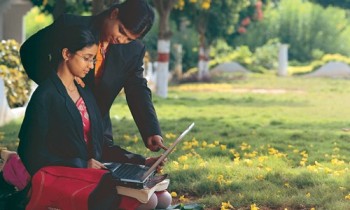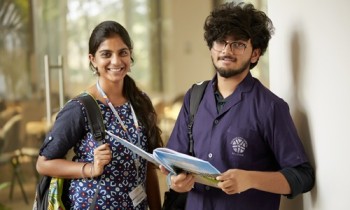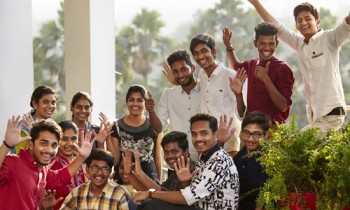- Programme Description
- Programme Structure
- Programme Enquiry
Programme Educational Objectives (PEOs)
PEO 1: develop diverse capability to work with tractor and implement manufacturing industries, seed processing industries, irrigation and drainage companies and also to run self-entrepreneurship like dairy farming and custom hiring centers.
PEO 2: take up higher studies in reputed institutes and motive towards innovative research by applying their skills in agricultural water management, farm machinery and power, processing and energy management systems in agriculture.
PEO 3: understand the issues of ethics, safety, professionalism, cultural diversity, globalization, environmental impact and responsibility of serving the society and the environmental issues.
Programme Specific Outcomes (PSOs)
Engineering Graduates will be able to:
PSO 1: utilize adequate knowledge in different disciplines of Agriculture engineering to gain better employment in various industries of Agriculture engineering.
PSO 2: use their expertise in planning judicious utilization of natural recourses and their management through advanced soil and water conservation techniques and various irrigation and drainage methods with the skill of data interpretation.
PSO 3: develop skills necessary to design the process and evaluate and come out with problem solutions of farm implements through adequate farm power for sustainable agriculture.
PSO 4: apply the comprehensive knowledge of engineering properties of agricultural produce for upgrading the unit operation and further develop effective value added technologies and become strong in quality control.
Programme Outcomes (POs)
The graduates of Computer Science and Engineering will be able to:
PO 1: Engineering knowledge: Apply knowledge of mathematics, science, engineering fundamentals and an engineering specialization to the solution of complex engineering problems.
PO 2: Problem analysis: Identify, formulate, research literature and analyze complex engineering problems reaching substantiated conclusions using first principles of mathematics, natural sciences and engineering sciences.
PO 3: Design/development of solutions: Design solutions for complex engineering problems and design system components or processes that meet specified needs with appropriate consideration for public health and safety, cultural, societal and environmental considerations.
PO 4: Conduct investigations of complex problems: using research-based knowledge and research methods including design of experiments, analysis and interpretation of data and synthesis of information to provide valid conclusions.
PO 5: Modern tool usage: Create, select and apply appropriate techniques, resources and modern engineering and IT tools including prediction and modelling to complex engineering activities with an understanding of the limitations.
PO 6: The engineer and society: Apply reasoning informed by contextual knowledge to assess societal, health, safety, legal and cultural issues and the consequent responsibilities relevant to professional engineering practice.
PO 7: Environment and sustainability: Understand the impact of professional engineering solutions in societal and environmental contexts and demonstrate knowledge of and need for sustainable development.
PO 8: Ethics: Apply ethical principles and commit to professional ethics and responsibilities and norms of engineering practice.
PO 9: Individual and team work: Function effectively as an individual, and as a member or leader in diverse teams and in multi-disciplinary settings.
PO 10: Communication: Communicate effectively on complex engineering activities with the engineering community and with society at large, such as being able to comprehend and write effective reports and design documentation, make effective presentations and give and receive clear instructions.
PO 11: Life-long learning: Recognize the need for and have the preparation and ability to engage in independent and life- long learning in the broadest context of technological change.
PO 12: Project management and finance: Demonstrate knowledge and understanding of engineering and management principles and apply these to one's own work, as a member and leader in a team, to manage projects and in multidisciplinary environments.
| Programme Name | B.Tech in Agricultural Engineering | |
| Level | Under Graduation | |
| Programme Specific Enquiries: | 0863-2344768 | |
| Admission Enrollment and General Enquiries: | 0863-2344777, 1800-425-2529 |
|
| HoD Contact Number | 9666079790 | |












